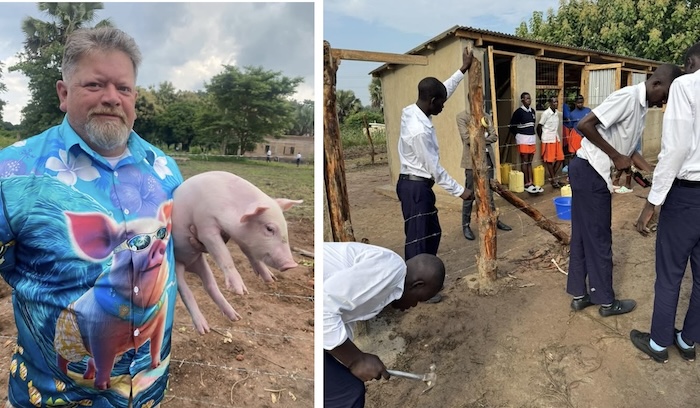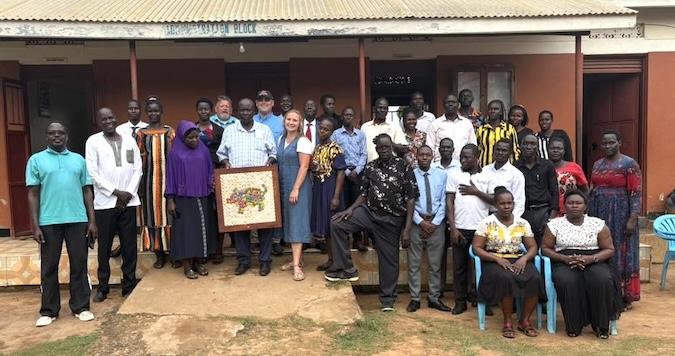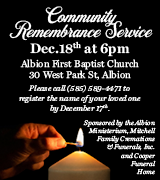Animal science teacher at BOCES spent month this summer in Uganda with Global Teach Ag Network
‘This global experience had to be one of the most impactful things that ever happened to me on a personal level, spiritually and educationally’ – Todd Eick

Photos courtesy of Orleans/Niagara BOCES: (Left) Todd Eick, former Medina teacher now an animal science teacher for Orleans/Niagara BOCES, holds a pig in Uganda. (Right) This group builds a structure.
Press Release, Orleans/Niagara BOCES
Todd Eick, the Animal Science teacher at the Niagara Career and Technical Education Center, recently spent a month over the summer in Uganda with fellow educators to support education initiatives in a small village at the Lira Secondary School.
“It is without a doubt the best professional development and experience I have ever had,” said Eick, who previously worked in Medina for 14 years as FFA advisor and animal science teacher. “There are not enough adjectives to describe that trip.”
The Global Teach Ag Network sent 12 educators, across the United States, to work with local schools in East Africa on global issues like agriculture and food security. The Teach Ag Uganda project is funded by the USDE (United States Department of Education) Fulbright-Hays Program and partners with Field of Hope.
The teachers had the opportunity to work one-on-one with peer educator colleagues in Uganda to advance agriculture projects in local schools. Eick was assigned to work on a team with the students on building a piggery for pig farming. He worked directly with two US teachers, one from Indiana and the other from Washington state, and three Uganda educators.
“We are all still in a group chat all the time” says Eick. “We built great friendships and had so much fun together. Such amazing memories and knowledge to share. I love telling people I know someone who knows something about this and that. I had such a wonderful time there.”

The staff at a school joins for a group photo.
Eick had applied for the grant opportunity to take part in the program last October and was thrilled to find out that he was selected to be part of the project.
“I was kind of the elder statesman since I had more time in education than anyone else on the team, but I learned a lot from everyone I worked with,” he said. “We helped the school build the piggery and showed them how to select the pigs and care for them. We left educational artifacts for them to use after we returned home to help them run the farm.”
The visiting teachers were fascinated on how the Lira Secondary school was run. A boarding school, there are 20-80 students in a classroom and the teachers rotate through each classroom.
Classes ran three weeks on and then three weeks off to allow the students to go home and help their families, many of them using the skills they learned in school to help their families generate extra money.
The students would be considered sophomores, juniors and seniors here. “Most of the seniors were learning so they could take the state test and had a lot of project-based learning as part of their education as well,” Eick said. “The students were shy at first, but they warmed up pretty quickly to us. They were so eager to learn. How they implemented their curriculum was cool. For one hands-on learning project, we worked together to string a barbed wire fence. The students caught on very fast.”
There was no cafeteria, but everyone ate together. “We stood in line with the students with our bowls and we usually had some sort of stew made with beans, maize and rice,” explained Eick. “It was fascinating. It is a very poor country, but they were rich in hospitality. They are truly the kindest, warmest people I have ever met.”
Eick, along with his fellow educators, also enjoyed a morning and evening safari to see the wildlife.
“It was magical,” he said. “We went to the Nile River. I must have taken hundreds of photos. We visited several villages and a dairy farm and that was eye-opening on how varied milk production is there than it is here.”
He brought back a Uganda hoe as a souvenir. “It cost me $3.75 and I had no idea how to use it, so the students had to show me. They thought it was hysterical. I have to say I learned as much from them as they did from me. I love this kind of teaching. It is a hand up not a handout. This global experience had to be one of the most impactful things that ever happened to me on a personal level, spiritually and educationally. I am enjoying bringing these lessons into my classroom, especially doing more with less and embracing a worldwide perspective on things. My students here have really embraced this and we now share things in class from art to the practical from different countries. I am really looking forward to taking some of the students to Belgium and the Netherlands next year to learn about their agriculture and way of life. I really want them to have the same experience I did with seeing a different culture.”






























































